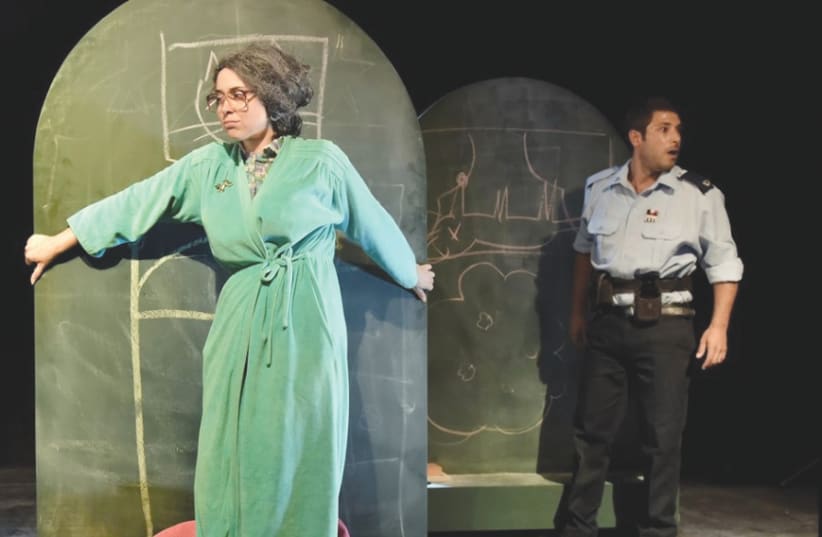Told by his mother (Tehila Sade Moriel) that the staircase under which they live is a palace, that his pet rat is a bat without wings, and that he would grow up to be a city employee, the protagonist navigates on a lifelike stage drenched in irony.
His limited understanding is a spotlight employed to show a wide scope of characters: an old woman (Miss Pitchfork) who prefers cats to people, a barren fumigator, a single mother with financial woes and so on.
All these different voices live in an urban Israeli space that is falling apart as rent prices mount. The humidity and heat increase as the number of rats, boars and jackals around them gets larger. City authorities attempt to keep some sanitation by exterminating these unwanted creatures, but nature will not abandon its desire to live and multiply.
On that level, the play is remarkably clear-eyed. Wild boars were seen in Haifa recently and jackal attacks are becoming more common in the South of the country. Israel is a very small place where wild animals find themselves locking horns and scavenging ever more closely to humans.
It is also an excellent choice to bring back a play focused on bats following the COVID-19 pandemic, which is often explained to the public as a breach between the wild world of our small leather-winged friends and our own human state.
This dramatic tool of a childlike protagonist is not new on the Hebrew stage. It was employed masterfully in the past by the late Hanoch Levin, among others. The Levin association is so deeply entrenched that it took me a while to untangle myself from it and see that Zehavi had taken it in a new direction.
True, the characters inhabit a fantasy world of filth and cruelty, in that dark and poetic sense Bats without Wings seems to be lifted from a well-established wing of Hebrew theater. It is also true that the linguistic fireworks Zehavi dazzles with sound a lot like the brilliance of another great playwright, Nisim Aloni.
“Love is like a rent collector,” Moriel warns Zehavi. “It enters without knocking and robs you blind” is gag that could have easily been written for HaGashash HaHiver in the late 1960s. Playing a rent collector, Itzik Gabai asks Zehavi, “What are you saying?” To which Zehavi, like Hamlet to Polonius, responds, “Words.” The gag works, yet there is method to it.
IT IS THIS overload of method that originally had me considering the option that the play got its prize for being extremely well built.
Not so. The play takes on two surprising turns that make it highly original and relevant to our own cultural moment. The struggle against the explosion of unwanted lives by dropping poison pellets to dispense with stray cats and dogs begins as a sort of theatrical joke to take on a powerful emotional force.
At its height, each character is presented alone against a cacophony of wild sounds. The ominous music serves Shachar Shalom well as he runs around the stage shouting, “What is this place? Africa?!” Without mentioning any of the political buzz-words about Sudanese migrants or Palestinians, Zehavi is addressing the deep fear in the Israeli mind.
“From spume and a wisp of cloud/ I built a White City,” wrote Naomi Shemer. What efforts must we take to keep that city, and keep it clean? The metaphor of city services and how they struggle to keep the number of stray dogs down proves to be remarkably potent.
The second turn is how the play suggests this effort will not end with animals but will eventually reach humans. Here, men charged with sexual harassment are castrated and their ears are cut to mark them as such, just as with pets. Zehavi asks Gabai (in the role of the head of the morality unit) why sending an improper text is deemed as if it was a physical assault.
“Castration,” responds Gabai. “I would prefer to have a person without a sex life than to risk another gaping hole in the soul of a child.” Many in the audience leaned in during these scenes and seemed very engaged with this viewpoint.
These two heights within the play, as well as the tour-de-force performance of the cast, makes Bats without Wings a terrific play that shows it is much more than mere method.
In fact, the deeper cycle-like structure of the play and its larger theme of a futile struggle against unforgiven forces larger than our own is essentially Greek tragedy cast in our own moment. The original set by Rona Mishol and Mai Sela also deserves praise, as it allows the actors to shift from a classroom setting to a graveyard and back again in mid-sentence.
A note to the reader: This production is without subtitles and requires a good grasp of Hebrew to enjoy it. Those recently arrived from the US might laugh, or cringe, at the over-the-top American accent of a minor character Mai Sela brings to life. All viewers, however, can smile when Shalom explains to another actor that, thanks to his authority as a city worker, “You may leave a complaint about my conduct, with me.”
‘Bats without Wings’ is back onstage at Temuna Theater at 8 Soncinio Street, Tel Aviv. NIS 75 per ticket. Phone (03) 561-1211 or email tmu-na@tmu-na.org.il. Call to inquire about future shows. Most fringe theater shows that have won the Gold Porcupine Award can be watched online for free at kipodhazahav.co.il/he/91.
